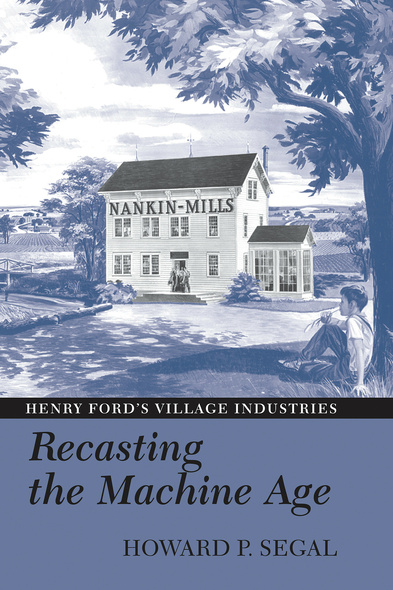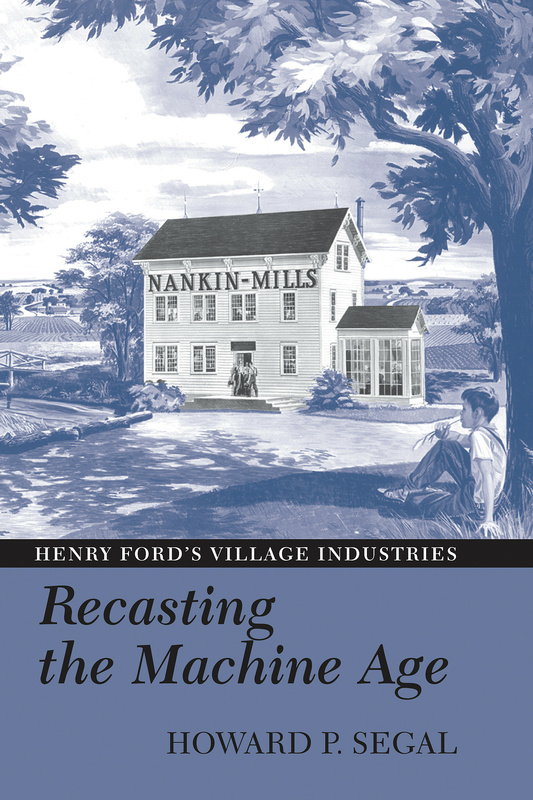Recasting the Machine Age
Henry Ford's Village Industries
University of Massachusetts Press
Recasting the Machine Age recounts the history of Henry Ford's efforts to shift the production of Ford cars and trucks from the large-scale factories he had pioneered in the Detroit area to nineteen decentralized, small-scale plants within sixty miles of Ford headquarters in Dearborn. The visionary who had become famous in the early twentieth century for his huge and technologically advanced Highland Park and River Rouge complexes gradually changed his focus beginning in the teens and continuing until his death in 1947.
Ford may well have been motivated to spend great sums on the village industries in part to prevent the unionization of his company. But these industrial experiments represented much more than "union busting." They were significant examples of profound social, cultural, and ideological shifts in America between the World Wars as reflected in the thought and practice of one notable industrialist.
Howard P. Segal recounts the development of the plants, their fate after Ford's death, their recent revival as part of Michigan's renewed appreciation of its industrial heritage, and their connections to contemporary efforts to decentralize high-tech working and living arrangements.
Ford may well have been motivated to spend great sums on the village industries in part to prevent the unionization of his company. But these industrial experiments represented much more than "union busting." They were significant examples of profound social, cultural, and ideological shifts in America between the World Wars as reflected in the thought and practice of one notable industrialist.
Howard P. Segal recounts the development of the plants, their fate after Ford's death, their recent revival as part of Michigan's renewed appreciation of its industrial heritage, and their connections to contemporary efforts to decentralize high-tech working and living arrangements.
This well-documented, balanced history contributes to the understanding of not only Henry Ford and his company but also the array of connections between social and technological change. This study will appeal to a variety of readers.'—Choice
'Howard P. Segal has written an important book that extends the scholarship of both the history of technology in America as well as its utopian ideals.'—H-Net Reviews
'This carefully written, thoroughly documented book combines extensive archival sources with broad coverage of the secondary literature. It goes beyond the specifics of the village industries to provide a window on the social, economic, and political debates of the interwar period as it related to technology, or as Segal refers to it, the 'machine age.' Historians, sociologists, geographers, economists, and political scientists who want an overview of the period from the perspective of technology, which Segal has covered in other fine works on the subject, will gain insight from this book.'—The Historian
'Segal's narrative runs counter to much that is commonly written and said about Henry Ford. If there is a moral to the story, it is that remarkable things can happen in the unlikeliest places. In Recasting the Machine Age, Ford the reformer overshadows Ford the autocrat. It is a compelling thesis backed by compelling evidence.'—Merrit Roe Smith, ISIS
'A thoughtful analysis of decentralization in the machine age . . . provides a valuable context to explain why auto companies are building their factories in small southern towns and why all types of industries are 'outsourcing' their work all over the globe. Segal shows that Ford was a precursor of this new world.'—Journal of American History
'A fascinating subject, one well deserving of a modern scholar's attention. . . . The book makes a significant impact on our understanding of Henry Ford's auto industry, America's machine age, and patterns of industrial decentralization.'—Amy Sue Bix, author of Inventing Ourselves out of Jobs?: America's Debate over Technological Unemployment
'Howard Segal's treatment of his subject is the best I have read, going far beyond anyone else's work and being as definitive as we likely shall see. 'Recasting the Machine Age' is fair, objective, scholarly, and up-to-date.'—David L. Lewis, author of The Public Image of Henry Ford: An American Folk Hero and His Company
Howard P. Segal is professor of history at the University of Maine and author of Future Imperfect: The Mixed Blessings of Technology in America (University of Massachusetts Press, 1994).





